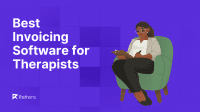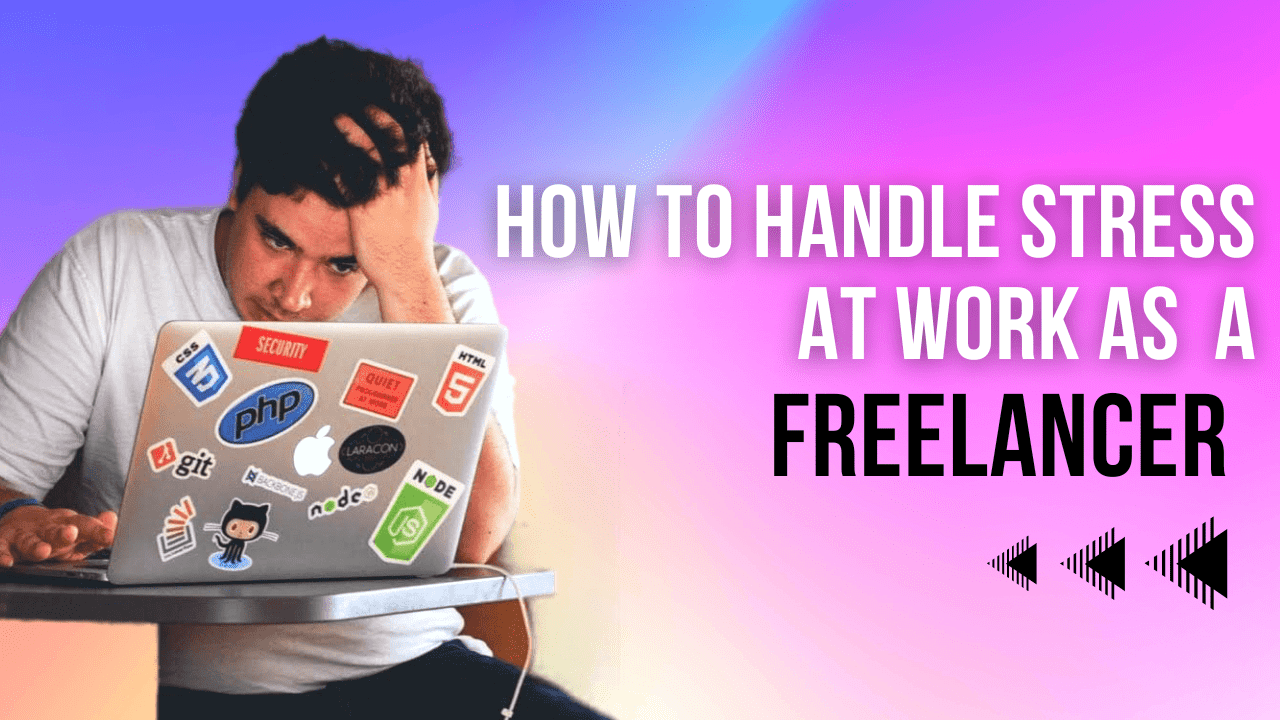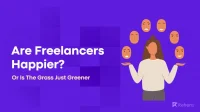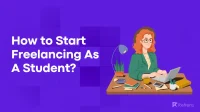For individuals who work a traditional 9-to-5 job, doing freelancing may appear to be a fun and flexible option, but it may be a difficult task. Burnout occurs at all levels o degrees of expertise, whether you’re freelancing full-time or using side employment to supplement your income.
You may have experienced burnout as a freelancer due to a variety of circumstances. You took on too many tasks at once, accepted low-paying offers, and even worked for free, all of which exacerbated your anxiety and despair.
Take a look at the mental health guide we put together!
As a freelancer, use these below-mentioned certain tactics to keep balanced and avoid burnout.
Do Freelancers Face Burnout?
When you’re burned out, you’re exhausted or dissatisfied with the demands of your job. So, if you’re having trouble making your freelance business a success, or if it already is, but you’re having trouble keeping it going? You’ve got a typical case of burnout on your hands.
Burnout is defined as “sentiments of energy depletion or tiredness; increasing mental distance from one’s employment, or feelings of negativism or cynicism connected to one’s career; and lower professional efficacy,” according to the World Health Organization (WHO).
Herbert Freudenberger originally used the term “burnout” in a psychology article in 1974. Burnout, according to Freudenberger, manifested itself as tiredness as a result of work’s excessive expectations, as well as bodily symptoms such as headaches, blocked thinking, irritability, and insomnia.
Stages of A Burnout
Burnout isn’t a set of sentiments that appear out of nowhere. Your ideas, feelings, and behaviors, on the other hand, develop through a succession of stages. Although the early stages may not appear to be significant, they can eventually build to a habitual phase that makes it difficult to do your job obligations.
- Honeymoon period
This stage is full of vitality and hope, much like the honeymoon phase of a marriage. It’s usual to feel satisfied when starting a new job or taking on a new activity, which leads to times of productivity and the capacity to tap into your creative side.
- The beginning of the stressful period
After a while, the honeymoon phase wears off, and you start to feel stressed. Although stress does not occur every second of the day, it does occur more frequently. Take note of any physical or mental indicators as this period begins.
You could find it easier to lose focus or be less productive when completing activities. Physical exhaustion can set in, making it difficult to sleep or enjoy outdoor activities.
- The phase of chronic stress
You’ll eventually reach a point where the stress becomes chronic. As the strain builds, your work is likely to suffer as a result of the stress.
Feelings of indifference, not finishing work on time, being late for work, or procrastinating throughout chores are all examples. You may withdraw from regular work-related talks on a social level.
You may grow enraged and lash out at coworkers in other circumstances. These feelings might sometimes follow you home and damage your relationships with friends and family.
- Phase of exhaustion
This is the point at which you’ve reached your limit and can no longer function normally. Workplace issues absorb you to the point where you obsess about them. You may also feel numb and have intense self-doubt at times.
Physical symptoms will worsen, resulting in chronic headaches, stomach troubles, and gastrointestinal concerns. Friends and family members may notice a shift in your conduct.
- Burnout is a common occurrence.
Burnout, if left addressed, can become ingrained in your daily routine and eventually lead to anxiety or depression. You may also develop persistent mental and physical weariness, which makes it impossible for you to work. If you continue along this path, your career may be jeopardized.
After you’ve determined whatever stage you’re in, you’ll need a strategy to help you prevent burnout and stay more focused and balanced. Examine the causes, symptoms, and strategies listed below and begin implementing and organizing them in your life.
Causes Of Freelancer Burnout
One of the leading reasons for freelancer burnout is being overburdened and overbooked with work. Other factors could include:
Deadlines that are unreasonable – Freelancers frequently commit to timelines that are unrealistic in order to acquire new clients or keep existing ones. And the less time you have to finish your assignment, the more prone you are to burn out.
Feeling Isolation – Freelancing is a difficult profession. Working without a team means you’re missing out on a psychological stress buffer.
Check out how to fight isolation as a freelancer
Avoiding delegation – If you don’t like delegating work to others, you’ll quickly become fatigued if you try to accomplish everything yourself. While you may prefer to do your core job in-house, failing to outsource the less critical jobs has a negative impact on your mental and physical health.
Now that we know what causes burnout, let’s look at the signs of burnout.
Symptoms Of A Burnout
Burnout is a difficult condition to recognize. However, it is not impossible to recognize when you are suffering from this mental illness.
Here are some of the most prevalent burnout signs and symptoms:
- Work indifference: Avoiding or deferring work responsibilities is a telltale indication of burnout. You may get jaded about the freelance routine over time, and you may begin to despise what you previously adored.
- Reduced productivity: Even if you aren’t avoiding work, a large drop in productivity could indicate an underlying cause, such as burnout, especially if you are finding it difficult to focus well on work owing to overload or stagnation.
- Mood swings: If you find yourself becoming upset or frustrated rapidly, or if you have unexpected bursts of rage or violence, it could be a sign that you are suffering from burnout.
- Physical signs and symptoms: Burnout and stress can cause more harm to your entire health than you might think. If you’re experiencing persistent headaches, backaches, neckaches, stomachaches, or indigestion, or if you’re continuously exhausted, you may have burned out.
Tactics To Keep Balance And Avoid Burnout
- Don’t compare yourself to others’ achievements
If you follow other creatives in your field on social media, it may appear that everyone except you has completed a successful project or is bragging about their newest professional achievement on some days.
There is no right or wrong way to approach your process, and comparing yourself to others will only serve to divert your attention away from your own outstanding work.
- Don’t overcommit yourself.
When your freelance job covers the bills, it’s difficult to set a workload cap, yet overcommitting can lead to missed deadlines, dropped assignments, and lost wages.
If you’re feeling overwhelmed by the amount of freelance work you have on your plate, try setting a weekly or monthly limit on how many jobs you’ll take on. When working on many projects for multiple clients in the same time span, be cautious.
For example, a writer has discovered that they are most productive when all of their writing efforts are directed to the same location since it allows them to concentrate on the tone and voice of a single magazine.
- Keep your inbox clear and don’t check emails all the time
Checking your email at all hours of the day and night might eat into your personal time. On weekends, for example, don’t check your work email at all, and on weekdays, don’t check it before 8 a.m. or after 7 p.m. This allows you to unplug and avoid feeling obligated to be always connected to work.
In our blog post, we’ll show you how to master perfect cold emails.
When an agreement document, payment invoice, or accepted pitch email gets misplaced in an overflowing inbox, it may be a nightmare. Having two emails, one for work and one for personal usage is sometimes the solution.
- Do not try to pay your expenses today with today’s projects
Almost every freelancer or contractor has had to collect an overdue payment from a client at some point, and it’s an unpleasant and awkward scenario.
Are you fed up with hunting down payments? Check out this article to learn what to do if a client refuses to pay.
Working two months ahead of time is a good rule of thumb to follow — that is, don’t try to pay today’s bills with today’s projects. Instead, set up your workflow so that payments from current projects will cover bills two months down the road. This will provide you some leeway in case of late or delayed payments, as well as assist you in avoiding work gaps.
If a payment is late, look online or in your editor’s email chain for the billing or accounting contact, and then contact them personally. Usually, a little nudge explaining your circumstance is sufficient.
Following up on a missed payment can be aggravating and stressful, but in my experience, there is typically a cause for the delay that is resolved eventually.
You can also use Refrens invoice generator to create professional invoices and receive an automated payment reminder that is sent to your client when payment is due.
- Recognize your worth
Knowing the minimal payment you’ll accept for a project comes with experience, but it’s critical to avoid being taken advantage of by clients.
I recommend looking at gig sites like Refrens to see what other freelancers charge for similar services, comparing rates based on experience and qualifications, and using Glassdoor’s compensation database to determine industry averages.
It’s easy to say no to freelance assignments and clients who pay less if you’ve determined how much your services are worth.
In order to make yourself valuable enough, it’s also critical to build your own personal brand.
To avoid burnout as a freelancer, you must arrange your workload and routine. Your time is valuable, so manage it properly and only take on as much as you can. Setting these healthy boundaries is crucial to having a successful freelance career.
The Fine Line That Separates Workaholism From Burnout
Few freelancers ever miss parts of traditional employment once they quit. Two examples are micromanagement and lousy coffee.
However, there are some advantages to working in a firm with a good culture that freelancing does not always deliver.
For starters, someone shuts out the lights, sends everyone home, and closes the office for the day. A freelancer could lose track of time until it’s 1 a.m. and she realizes she hasn’t eaten in hours!
It may be more challenging to track your own progress and growth as a solopreneur. Because you can’t precisely promote yourself, validation may be more difficult to come by until you start receiving glowing testimonies!
For all of these reasons, freelancing can be confusing at first. Certain personality types dive right in with a vengeance and quickly become physically, emotionally, and psychologically exhausted. Others turn on their laptops and appear to enter a state of flow almost immediately. If they want to work as a freelancer for a long time, both personality types must learn to meet in the center.
Regular Physical Activity To Avoid Burnout
Adults should engage in at least two and a half hours of physical activity every week to maintain their health and improve their quality of life, according to the guidelines.
The more you exercise, the more benefits you’ll reap, including:
- Keeping one’s mental health in excellent shape
- Reducing stress
- Enhancing one’s capacity to manage it
- Getting enough sleep
- Improving concentration
- Relying on a healthy immune system
As a freelancer, here are five reasons to stay physically active.
Yes, being physically active on a regular basis is a good idea for everyone, but here’s why it’s especially vital for freelancers:
- It’s when you have some time to yourself
We’re constantly balancing freelance contracts and tasks. The physically active parts of our day will be reserved exclusively for us. These are the times when we don’t have to think about anyone else.
- It’s your ally when it comes to coping with daily stress
Physical activity aids in the reduction and management of stress. Everyone deals with stress on a daily basis, but self-employment can add to the burden. Physical activities can assist us in better managing them.
- It allows you to concentrate on the most important things
We can use our physical activity to reflect and refocus on the important things in life. It’s as if your mind has been cleansed.
- It enables you to improve your focus and productivity
Participating in sports enhances cognitive abilities, such as concentration. What could be better than feeling serene, at ease in your own skin, and laser-focused on the tasks at hand?
Boost your productivity in 6 Smart ways!
- Avoids burnout
The regular downtime we will provide ourselves will force us to take breaks and reflect on ourselves. This allows us to be in a better mental and emotional condition, reducing stress and giving us a greater sense of control over ourselves and our surroundings. This is crucial in avoiding burnout.
Self-Care 101 For Freelancers To Avoid Burnout
The most valuable resource for a freelancer is himself. Self-care, on the other hand, isn’t high on most freelancers’ priority list — especially in the early days and during rush periods!
So, if you need a reminder that neglecting self-care has negative consequences for your health and work quality, as well as an increased risk of burnout, here are four simple tactics for better self-care:
- Connect
Don’t confuse all of your work calls and emails with social interaction. Make an attempt to make eye contact with others. Depending on your preferences, this could entail spending time with friends, attending networking events, or working from a co-working facility or café.
Isolation stifles innovation. When you’re stuck, getting out of your thoughts and talking to people can help. The conversation not only helps you relax, but also provides you with new insights and ideas.
- Delegate
You probably appreciate the concept of doing things on your own as a freelancer. Maintain a realistic perspective on how much you can accomplish in a day. Include all billable, work-related duties, as well as any additional chores or responsibilities.
Even seemingly insignificant duties such as meal preparation, cooking, vacuuming, watering the plants and walking the dog consume time and energy. It’s unrealistic to expect to be able to do everything on your own! Taking on everything can make you unpleasant and bitter in the long run. When you require assistance, ask for it.
Make a list of the duties you must complete on your own and assign the rest. For a wide range of activities, software and apps are available. Delegating time-consuming chores that do not demand your continual attention can help you save a lot of time.
- Guilt-Free Breaks
Do you ever feel like you have too much to do and not nearly enough time? Do you find it difficult to take a break because you are constantly pushing yourself to get everything done? Perhaps you do take breaks, but you can’t seem to stop your mind from ruminating on pending duties or making plans for the future.
Maintaining an around-the-clock work ethic is unachievable and exceedingly unhealthy. Working with planned breaks is more effective than working nonstop. Every now and then, your mind and body require some ‘downtime.’ It also doesn’t help to feel bad about taking a break! Allow yourself the luxury of taking a break. Don’t worry; it won’t throw your plans off track. It will, in fact, re-energize you to produce higher-quality work.
- Healthy Ways Of Life
Taking care of your body is one of the simplest ways to assure self-care. How do you go about doing that? Eat healthily. Sleep soundly. Also, get moving!
- Avoid junk food as much as possible, or at the very least replace it with better ones. Aside from the well-known hazards of diabetes and obesity, a diet high in sugar and processed foods makes you drowsy and distracted. Eat healthful meals on a regular basis.
- Find something you enjoy doing and make it a point to move on a daily basis! Physical activity has been shown to provide numerous health advantages, including reduced stress, anxiety, and depression, as well as increased energy, resilience, and cognitive performance.
- It is equally crucial to obtain enough rest in addition to staying well-nourished and active. You’ve probably noticed that when you’re sleepy, your productivity suffers. Did you know that not getting enough sleep impairs your memory and attention, making it difficult to learn new things? If you haven’t gotten enough sleep, it can impact your decision-making.
Recommended Reads: Top Invoicing Software For Consultants
Motivational Books, Podcasts and Videos to Beat The Burnout
Videos
- How to bounce back from burnout: 3 simple steps by Allan Ting Tedx
- How to fix the exhausted brain by Brady Wilson TEDx
- If you are burnout watch this by Jay Shetty
- Taking Care of yourself by screenskills
- Full time to freelance – practical and self care advice for when the 9-5 has to stop by Kerry Putman
- Self-Care: What it really is by Susannah Winters
Books
- Work-Life Brilliance: Tools to Break Stress and Create the Life and Health Your Crave
- The 4-Hour Work Week: Escape the 9-5, Live Anywhere and Join the New Rich
- Life’s Amazing Secrets: How to Find Balance and Purpose in Your Life | Inspirational Zen book on motivation, self-development & healthy living
- Work-life balance: the ultimate guide to balancing your work and life
Podcasts
- The 5 am miracle podcast by jeff sanders
- The Tim Ferris Show
You’ve got this! Burn that burnout!
Conclusion
If you want to generate more money as a freelancer, you may always take on more projects. However, bear in mind that if you appreciate what you’re doing, it’ll be a lot more worthwhile.
In the end, too much labor and repetition in your daily routine might cause you to get anxious and burned out. Mixing things around will give you a boost in terms of well-being and results.
We hope the tips above help you strike a healthy work-life balance and keep your passion from becoming a tedious job.
A work-life balance guide for freelancers!
Recommended Reads:
Top E-Invoicing Software in India: Detailed Analysis
Top 10 Inventory Invoice Software
Best CRM Software with Invoicing
Top 10 Billing Software For Chartered Accountants
Top 7 Invoice Generator Software

















